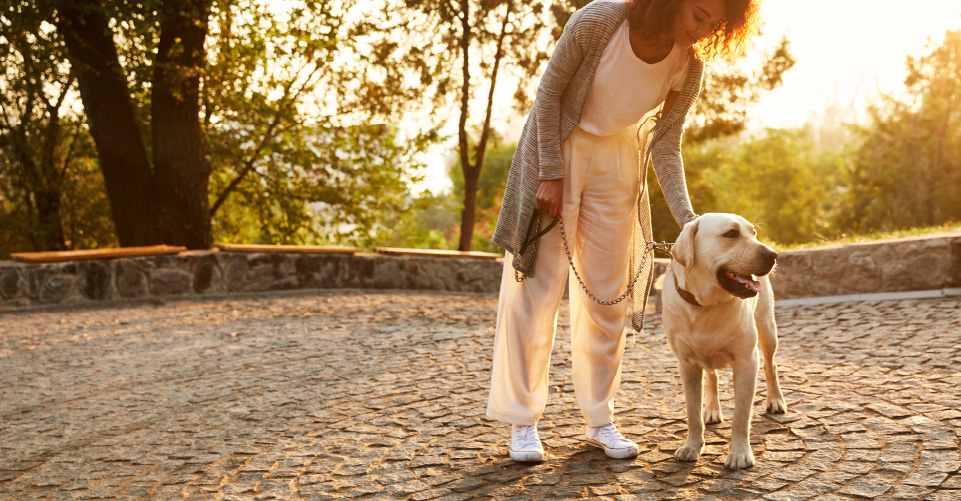Dr Trudie Prinsloo is a qualified veterinarian and attorney. In 2015, she started Legalvet Services to provide legal advice to the animal health and veterinary industries in South Africa – and now she’s teamed up with us to tell us more about dog leash etiquette and laws in South Africa.
dotsure.co.za is not responsible or liable for any advice or any other information provided herein.
I am convinced Troy, our Giant Schnauzer, is a mind reader. He always knows when I decide to take him for a walk. Long before I say or do anything that could give it away, he gets excited and runs to fetch his leash. He knows that he can only go outside if he has his leash.
Dogs need to exercise, and they need stimulation. Walking is a great way to provide this. But with it comes several responsibilities. When walking our dogs in public areas, we must keep them safe from dangers that they may not be aware of, such as speeding cars. On the other hand, we also have a responsibility to make sure that our dogs do not pose a danger to people or other animals. And while protecting our pets and other people, we must still make sure that we obey all relevant rules and laws.
Some Leash Etiquette
One of the joys of walking a dog is meeting other people and their dogs. I make a note on my phone of the names of the people and dogs that Troy and I meet on our walks as soon as we get home. The next time we see them, I greet them by name. Most people we encounter on our walks are wonderful dog owners who automatically know good dog leash etiquette. If you are a first-time dog owner, or sometimes wonder what is expected of people walking their dogs on a leash, here are some basic guidelines:
1. Always have your dog on a leash in a public area, unless it is expressly indicated that they may be off-leash. And also make sure that if they are off-leash, they are well-behaved and will not attack other dogs or terrorize other dogs.
2. Never take an untrained adult dog on a leash into a public area. It will be super stressful for your dog and for you. Train your puppies to walk on a leash from eight weeks old and make sure they are well socialized. This is the best and easiest time to train a dog. If you must train an adult dog, rather get assistance from a professional dog trainer, animal behaviourist, or veterinarian.
3. Do not allow someone who cannot handle your dog to take it dog for a walk. Recently I came across someone who insisted that I walk a huge detour with Troy because she was not capable of controlling her dog at all. Not only is that rude, but it is also dangerous. She will face serious legal consequences if her dog harms someone.
4. Understand that a leash influences your dog’s natural behaviour. This could lead to unexpected aggression in an otherwise gentle dog. If your dog does this, get help from an animal behaviourist as soon as possible.
5. Be considerate towards other dog walkers, pedestrians, and property owners. Do not trespass with your dog and please pick up the dog's poo!
6. Avoid direct contact between your dog and other dogs, including dogs behind fences. Cross the street or move to a different area if necessary. Only allow brief contact between your dog and another dog on a leash if you know your dog very well and the owner of the other dog is confident that their dog will be fine too and agrees to an introduction.
By-laws
Most local authorities have by-laws that specifically deal with the control of animals in public places. Although the by-laws differ amongst different municipal areas, they generally require that dogs must be on leashes in public spaces, unless they are in designated areas where off-leash presence is allowed. These by-laws provide for fines to be imposed on people who transgress them or for seizing and impounding the animals.
Common law
The common law principles of the Actio de pauperie are always relevant to dog owners. This means that dog owners are strictly liable for any damages caused by their pets, even if the owner did not act negligently. Although the Actio de pauperie does not require you to keep your dog on a leash, doing so will help you prevent your dog from causing harm to anyone.
Animals Protection Act[i]
Most dog owners who care enough to take their dogs for walks will not deliberately harm their pets. However, if how a leash is used, or the material used to make a leash causes the dog to suffer unnecessarily, it is an offence as defined in the Animals Protection Act and will be punishable. If you see anyone causing their dog to suffer in this way, please report it to the nearest SPCA branch.
Please be responsible when walking your dog, but don’t forget to have fun and make it enjoyable for your dog too!
[i] Animals Protection Act No 71 of 1962
PAWRENTS WHO READ THIS ALSO READ:



